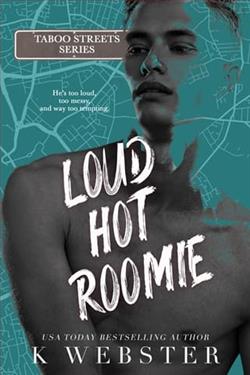Page 79 of SEAL'S Baby Surprise
Julia zips back over to me. “I love you, Daddy. And I love Lee, and baby Al, and Aunt Kandis, and Uncle Richard, and Mimi and Pops Quinn, and Pops McKinney, and Artie . . .
I realize that while I love Lee, Julia, and Al the most, I love all those other people, too. Family, friends and neighbors . . . I am a rich man in ways that I never dreamed possible.
POST EPILOGUE: TEN YEARS LATER
Julia
I watch as Uncle Richard again reads the address from his phone. “I know this is where the GPS shows we should go,” he says. “I sure wish I knew why Andrew wants us to go through this stuff.”
My dad says, “Who knows? I sure don’t. Maybe I’d understand better if I’d ever met him.”
“We could go see him,” Mama Lee says. I call her Mama Lee because it makes her happy. She isn’t my birth mama, but she’s been mom to me since I was six years old, and Daddy married her. It’s kind of funny, because Al couldn’t say “Mama Lee” so he calls her “Momly”, even though at ten years old he can say it right.
Don’t get me wrong. I love my little brother, but he can be a real pain sometimes. Aunt Artie, who runs a free clinic, and Mother Hubbard, who has a cottage school, both say that being a real pain is perfectly normal for ten-year-old boys.
Mimi says that we owe it to him to teach him better. I just wish it wasn’t up to me to teach him, sometimes. Not always.
Daddy dotes on him, but still doesn’t let him get away with stuff. He dotes on me, too, and doesn’t let me get away with things, either.
Sometimes I wish he wasn’t so very dedicated to being fair. Especially since we have two younger sibs: Augusta, age eight and Thomas, age six.
We have cousins, too. Charlie, age fourteen (who is a bigger pain than my brother), Lettie, age eight, and Winnie, who is age six, like Thomas.
“There it is!” says Aunt Kandis, pointing at a neon sign that reads: Temperature Controlled Storage.
Uncle Richard pulls into the driveway, and goes into a little office building. He leaves the bus running — yeah, that’s right. A bus. It takes that to seat all of us. Anyway, he leaves it running so he can keep the air conditioner on.
He comes back, then follows an attendant on a motor scooter down into a maze of units with roll-up doors, and then through a maze of more units that have regular doors. Then he arrives at one, gets off his scooter, and unlocks the door for us.
We all pile out into the August southern California heat. Then we go inside the unit. It’s not just cool in there, it is almost cold.
Inside, it is stuffed with boxes. There doesn’t seem to be any order to them.
But in just a few minutes, a car drives up outside. Caleb, Uncle Richard’s “fixer” and Andrea, his secretary, walk in. Andrea is carrying a tablet in her hand, and she goes along the box stacks.
“If what he sent is correct,” she says, “This should be the one.”
Andrea is about a hundred years older than God, and she’s super efficient. She’s been Uncle Richard’s secretary since before he and Aunt Kandis were married.
If there’s anything to know about the family, she probably knows it because she was Grandpa Lane’s secretary before she was Uncle Richard’s.
Grandpa and Grandma Lane are dead. They drowned when the cruise ship they were on sank off the coast of Africa. They had been visiting Uncle Andrew, who has been in Africa as part of a medical missionary team since about forever.
Now, Uncle Andrew has sent a text to Uncle Richard saying that he should look for Grandpa and Grandma Lane’s personal effects that are stored in this big place.
Farther on, past the boxes, I can see that there is furniture, recreational stuff, like golf clubs, and that kind of thing.
“Where do you think those papers might be?” Richard asks Andrea.
She shrugs. “Honestly, I have no idea. I know that your father went a little ancestor-mad about the time that Rylie was about six years old, and that was when he started insisting that she be placed in boarding schools.”
“I wondered about that,” Richard said. “Neither Andrew or I went to boarding school. Or at least not until we were in our teens and Dad got this bee in his bonnet about sending us to West Point. I remember the high old temper tantrum he threw when he learned that we had to be at least seventeen.”
“So what did he do?” my dad, Austin, asks.
“Sent us to military prep schools,” Richard replies. “We got shuffled around a lot because Dad would be upset by some school policy or other that didn’t fit his idea of what we should be doing or learning. It doesn’t make for a real stable lifestyle,so by the time I hit NYU, I was pretty much of a real . . .” he pauses, looking around at the assortment of young ears who would overhear his words, “idiot.”
“You weren’t quite that bad,” my dad says. “But you weren’t real focused. You were a great drinking buddy, though. We could always absolutely count on you to stick with us, no matter what kind of mess we got into. Even though the lot of us nearly got expelled a time or two.”















